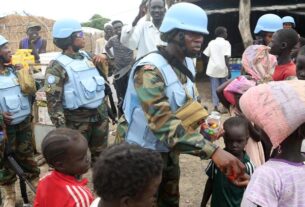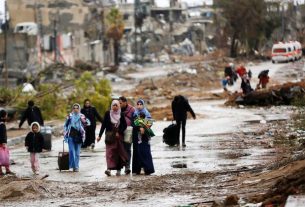United States Secretary of State Antony J. Blinkin, in a recent press statement of “religious freedom designations”, on 2 December 2022, designated some of the organizations as entities of particular concern. In his briefing, he mentioned Al-Shabab, Boko Haram, Hayat Tahrir al-sham, the Houthis, ISIS-Greater Sahara, ISIS-West Africa, Jama’at Nusrat al-Islam Wal-Muslimin, the Taliban in Afghanistan, and the Wagner Group, based on its action in the Central African Republic. Most of these groups are vigorously active in the Western part of Africa. However, it is also equally important to understand how these groups propagated their agenda in different regions of Africa. Boko Haram remains the predominant among all the terrorist groups, which makes West African countries stand at the top in reports of the Global Terrorist Index, consequently for three years. Four are among the ten countries with the highest death rates from terrorism. Niger(Islamic State) replaced the Taliban (Afghanistan) as the world’s deadliest terror group in 2021. This research deals with how the baton of extremism is getting transferred from West Asia to Western Africa and how West Africa is becoming an emerging hub of terrorism worldwide.
History of Terrorism in West Africa
It is the colonial powers in Africa classified the independence movement as terrorism to retain control. It was between the 1950s and 70s. Many West Asia-based organizations, such as Al-Qaeda, considered Africa their springboard for global terrorism in this new era. However, Mokhtar Belmokhtar, once a smuggler, later turned antagonist in the African region after getting trained in Afghanistan, came up with the thought of merging two offshoots of Al Qaeda in Islamic Maghreb(AQIM), which were Al-Mulathamun Battalion and Tawhid Wal Jihad(TWJWA) into one unit that is Murabitun, in 2013. Its main motto was to “unite all Muslims from Nile to Atlantic in Jihad against westerners,” along with liberating Mali from France. Before the merger, both groups were involved in several attacks and killings of westerners in Africa, especially in West Africa. The US embassies were attacked at places like Nairobi, Kenya, and Dar Es Salaam, Tanzania. Therefore following the 9/11 terror attacks, which reshaped not only the global response towards terrorism but also a new narrative of global Jihadist threat became dominant.
Catalysts in the Proliferation
It’s difficult to understand the only factor behind the expansion of terrorism in West Africa. Still, going by the bird’s eye view, a few catalysts could be considered for supporting the enhancement of extremist thoughts.
First and foremost, the loose hold of the government in countries like Nigeria, Niger, Burkina Faso etc., has deliberately created the environment for terrorist organizations to flourish in African society. The basic polity of the West African countries is not up to the mark. Agencies like Law enforcement bodies, regulatory agencies, and judiciary suffer from the chronic dysfunctional mechanism, which needs immediate focus to address challenges of terrorism and terror funding.
Moreover, African society is suffering through a weak social contract; due to the feeling of alienation from political governance and not having equal opportunity because of different ethnic/religious groups, which convince them to discern corrupt government agents; and politicians who sponsor terror organizations. People across this region have an unshakable faith in the religion which invites clashes of legitimacy between the state and religion. However, religion remains the only fodder for creating ghettos among the people refraining from collectively making the evolving society with the tempo of the contemporary world providing various sustainable development goals (SDG). Thus, this broadens the aperture of division between geographic regions within a country, just like the division between the Northern and Southern parts of Nigeria.
Other than that, for terrorist organizations like Boko Haram, it’s easy to recruit ordinary people into the organization, as they offer jobs to satisfy the needs of people from different age groups, irrespective of the backgrounds they come from. Their recruitment process is entirely different from the rest of the terrorist organizations in West Asia and West Africa. They start recruiting at the very beginning from the age group of four to fourteen, and almost all members are almajiri. However, Almajiris are left to themselves and are therefore vulnerable to manipulation and exploitation. Imagine a crowded street in Abuja (Nigeria’s Capital) where they starve for food. Since “Alms” giving is promoted in Islam makes it more lubricant to get into the mechanism of this organization. Also, the borders between the countries in West Africa need to be more specific. These vague borders allow people to sneak into other countries, proving a boon for terrorist organizations to conduct infiltration and arms smuggling. The security and surveillance at different national borders could be more convincing through these fuzzy borders.
One of the most influential factors is religious fundamentalism. Religion remains an important factor in binding people together in West African countries. People rely on religious institutions on matters related to justice (civil and legal justice), economic assistance, etc., which tend to nourish their extremist thoughts and convince them to approach religious institutions more often than government institutions. In countries like Nigeria, the Al-Majiri system is highly preferred. It stands as the most controversial system of Islamic education, which has been criticised for pushing youth towards extremism rather than equipping them with vocational skills and employable education to help them get jobs. Thus, for this unemployed and hopeless youth, “known devil (Terrorist organizations) becomes better than unknown saint(government institutions).”
Financial sponsorship for Terrorism:
Research was conducted by renowned institutions FATF and GIABA to trace and analyze the methods used by terrorist organizations to utilise and distribute the collected funds in West Africa. However, these organizations get fueled through trade and other lucrative activities. Not just this, but NGOs and Islamic charity organizations such as the US-based Holy land foundation stayed financier for a more extended period; apart from that, funding is also showered through various developmental projects of World Banks and Aids packages,” informal and illegal currency exchange service provider” (GIABA report 2020), “extractive industry/mining sector”(GIABA Oct 2019), cattle/livestock swish, local businesses(sale of dry fish, sale of kola nuts, confiscated farms) of an organisation like Boko Haram, demands of the slave market in Nigeria, funds collected from drug trafficking and smuggling of arms remain the piggy bank for these organisations. However, the bandwidth of this terror financing is massive, which takes root in society and is immunised from every counter-terrorism activity. Thus, it elevates these organisations to become almighty in the world of extremism.
Conclusion
In light of this information, the proliferation of terrorism in the West African region penetrated people’s psyches. An organization like Boko haram is condensing from a terrorist organisation to the saviour of Nigerian society. (almajiris) glorifying and pursuing “pie in the sky,” leading them into chronic ignorance and making them herds available for recruitment. However, without a shadow of a doubt, West Africa seems to be competing with west Asia in harbouring terrorist organisations.



